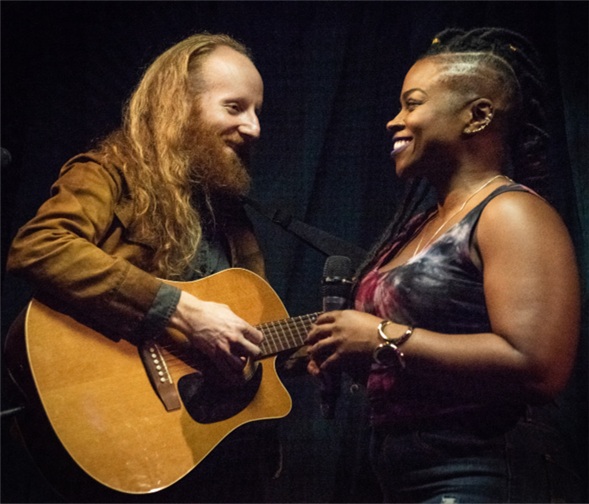Translate Page

Andrew R. Butler's new folk musical is set two centuries from now but speaks to today
---
A man with long, unruly red hair and a matching beard takes the Ars Nova stage with a guitar. He says his name is Rags Parkland and he's going to be singing some tunes. He strums his instrument and croons a love song -- but his object of desire is surprising. "You're a robot. And I love you just the same." In Andrew R. Butler's Rags Parkland Sings the Songs of the Future, folk music continues to be the voice of the people in 2268, even though some of them are now cyborgs.
Butler, who created the show and plays Rags Parkland, was inspired by Philip K. Dick's short story What'll We Do With Ragland Park? about a folk singer who writes songs that end up coming true. "A folk musician in the future felt immediately really rich," Butler says. The combination of a genre that's seen as retro with science fiction "immediately creates a fun context. The character can be thinking about history, and some of that is our present and some of that is our past, and that character can also be thinking about the future, which immediately changes our temporal framework in a way that is exciting."
In Rags Parkland, Butler and his band of outlawed "constructed humans" are on the run from the authorities. To keep their spirits up, they hold a secret underground concert for humans and "beautiful machines." But don't expect these robots to look and act like Data on Star Trek. They're more like the replicants from Blade Runner (another Philip K. Dick tale): They have emotions, they're artistic, they seem human in every way except they're synthetic.
{Image1}
Even though Rags Parkland is set centuries from now, like all insightful sci-fi, it addresses contemporary issues, asking provocative questions about what it means to be human, and how that label has been used to oppress different groups throughout history.
"Robots who are ostensibly people fundamentally shift the way that we define people, which raises the question of defining people," says Butler. "This is a practice that we as humans continually and destructively engage in. "
Because the show is structured as a concert, the characters' backstories are revealed slowly, often during patter in between songs. At the outset, the audience doesn't even realize they're robots, which is by design. "When you walk into the question of the humanity of being -- who behaves and experiences and identifies in the world as human -- but you start it from a place of how they were built and what they're physically made of, it's easy to run into resistance," Butler explains. "But approaching it from this other direction, where you start with the people and their experiences and their music, it becomes much easier to be like, well, of course this is what it is to be human."
When Butler started working on the show eight years ago, he didn't intend to craft a meditation on humanity. He just wanted to create a fun, theatrical folk concert, which is why Rags Parkland is light on exposition and heavy on music. Butler was inspired by Bob Dylan and Woody Guthrie, folk artists who wore their political views on their guitars. "The show definitely hearkens back to the idea of folk music that is invested in communicating stories and carrying history," he says. "I remain invested in the format of the show being a concert. It asks you to mine all of the parts of it for enough details to piece together a picture of this world."
And while that image may not be rosy, Butler hopes that in listening to the songs, audiences will leave thinking "not just about the patterns of oppression and abuse and fucking evil, but also perseverance and resistance and bravery."
---
Follow Diep Tran at @DiepThought. Follow TDF at @TDFNYC.
Top image: Andrew R. Butler and Stacey Sargeant in Rags Parkland Sings the Songs of the Future. Photos by Ben Arons Photography.
TDF MEMBERS: Browse our discount tickets to theatre, dance and concerts.